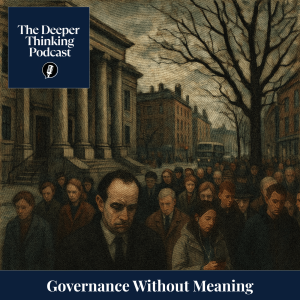
Saturday May 31, 2025
Governance Without Meaning - The Deeper Thinking Podcast
Governance Without Meaning – Why the System Still Functions Even as Public Trust Disappears
For those tracking the emotional, epistemic, and conceptual shifts reshaping public life.
What happens when institutions continue to operate but can no longer be interpreted? In this episode, we explore the quiet, often unseen reconstitution of governance—not through collapse or crisis, but through the slow erosion of shared metaphors, emotional coherence, and civic intelligibility. We trace how affect has replaced accountability, how performance has overtaken deliberation, and how trust now functions more as atmosphere than architecture.
This is not an episode about dysfunction. It’s about a system that works—in form—but no longer means. Drawing from political philosophy, philosophy of language, and affective politics, we map how governance has evolved from vision to calibration, from coherence to synchronization. With subtle nods to thinkers like Byung-Chul Han, Karen Barad, and Michel Foucault, we consider what happens when political meaning is displaced by tempo, optics, and mood.
We examine not only how public life is felt, but how it is formatted. From the evacuation of consequence to the saturation of language, from resilience as moral camouflage to legitimacy as narrative choreography—this is a meditation on systems that no longer collapse, but drift. The goal is not to restore belief, but to rethink the conditions under which belief might once again become possible.
Reflections
Here are some insights that surfaced along the way:
- The system hasn’t failed—it’s recalibrated itself to function without meaning.
- Public trust is no longer earned. It is engineered as ambiance.
- Emotional stability now stands in for political legitimacy.
- Language still performs—but increasingly, it does so without reference.
- Resilience has become institutional decorum for managed abandonment.
- Governance has become mood management under the guise of response.
- The future is not a shared destination—it is a bandwidth to be moderated.
- Silence is no longer avoidance. It is the space where concepts fail to cohere.
- To critique is not to resist collapse—but to name the drift.
Why Listen?
- Understand how governance persists even when meaning does not
- Explore how attention, affect, and language have replaced ideology, coherence, and deliberation
- Learn how systems simulate continuity while operating through symbolic inertia
- Engage with Han, Barad, and Foucault on legibility, surveillance, and epistemic power
Listen On:
Support This Work
If this episode resonates and you'd like to support future conversations, you can do so here: Buy Me a Coffee. Thank you for staying with the questions.
Bibliography
- Han, Byung-Chul. Psychopolitics: Neoliberalism and New Power. Verso, 2017.
- Barad, Karen. Meeting the Universe Halfway. Duke University Press, 2007.
- Foucault, Michel. Discipline and Punish. Trans. Alan Sheridan. Vintage Books, 1995.
Bibliography Relevance
- Byung-Chul Han: Frames how governance now operates through affect, visibility, and digital compliance.
- Karen Barad: Offers a framework for understanding institutional entanglement, power, and meaning-making.
- Michel Foucault: Illuminates the evolution of power from force to norm, from law to affective control.
Systems don’t need belief to function. They just need rhythm, ambiance, and the appearance of response.
#PoliticalPhilosophy #ByungChulHan #KarenBarad #Foucault #Governance #Trust #Meaning #InstitutionalDrift #CivicLife #MoodManagement #TheDeeperThinkingPodcast #Simulation #SemanticExhaustion
No comments yet. Be the first to say something!